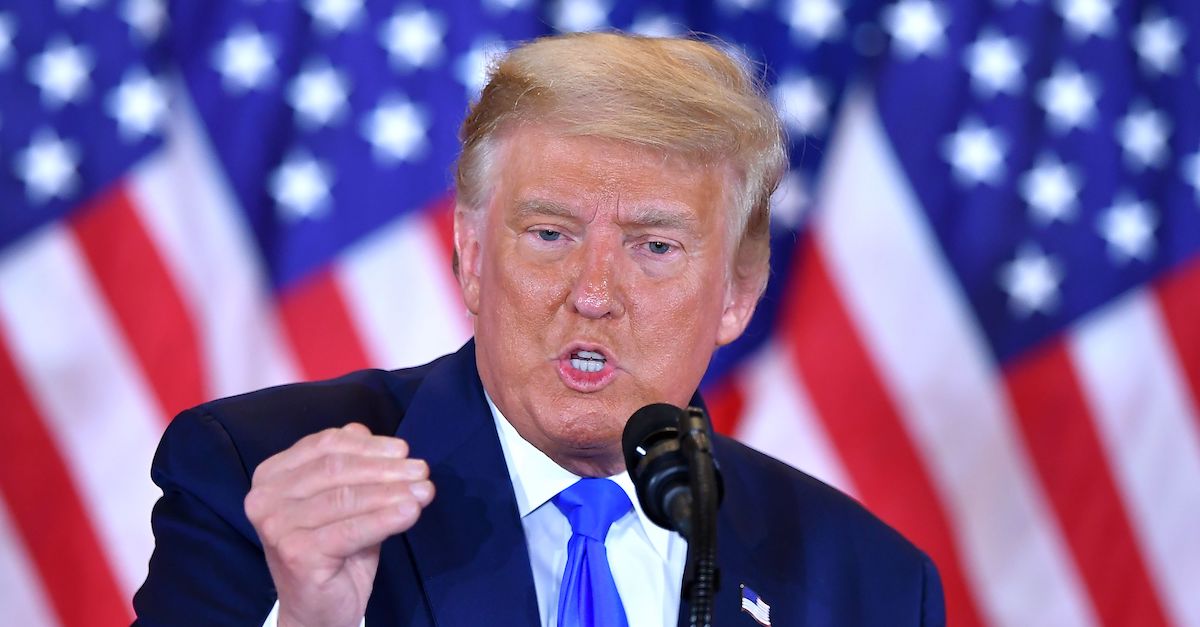
As states continue to tally election results, and the president’s campaign team continues to file more lawsuits, Americans are wondering what effect litigation might have on the outcome of the presidential election. The reality is that an endless loop of lawsuits theoretically has potential to help Donald Trump secure reelection.
There’s a federal statute that means December 8 will function as what’s known as the “safe harbor” deadline. Occurring about a month after Election Day, December 8th is the deadline for final resolution of all election disputes, including court challenges. It is the final date on which slates of electors must be chosen by states for submission to Congress.
If things aren’t settled by then, Congress is under no obligation to accept the validity of electoral votes submitted by states. Instead, the newly-elected Congress will gain legal authority to determine the winner in any state that has not resolved its election drama by the deadline.
Here’s the statutory language:
If any State shall have provided, by laws enacted prior to the day fixed for the appointment of the electors, for its final determination of any controversy or contest concerning the appointment of all or any of the electors of such State, by judicial or other methods or procedures, and such determination shall have been made at least six days before the time fixed for the meeting of the electors, such determination made pursuant to such law so existing on said day, and made at least six days prior to said time of meeting of the electors, shall be conclusive, and shall govern in the counting of the electoral votes as provided in the Constitution, and as hereinafter regulated, so far as the ascertainment of the electors appointed by such State is concerned.
The “safe harbor” deadline is a major reason why things went as they did in the 2000 Bush v. Gore case.
During the 2000 presidential election, Florida reported that George W. Bush had won the state by 1,784 votes. Given the tiny size of the margin (less than one percent), Florida law mandated an automatic machine recount; that recount later showed that Bush only prevailed by 327 votes – a situation that entitled Al Gore to a manual recount. Gore requested that recount in five counties.
As those counties started their recounts, it became clear that they probably did not finish within the seven-day deadline required by Florida law. Florida’s Secretary of State found that the counties in question did not meet the state’s legal requirements for accepting late filings, and on that basis, certified George W. Bush the winner in Florida.
The Gore campaign sued for the right to have a manual recount, and won in Florida state court. That ruling was appealed to the United States Supreme Court, and on December 9, SCOTUS ordered a stay of the recount order.
Seven justices agreed that having a manual statewide recount would violate the equal protection rights of some voters; only five justices, though, agreed on what to do about it. One of the problems, noted by the Court, was that the mechanism for recounting differed wildly from county to county. Both the five justices who voted to stop the recount and those dissenting on that remedy stressed the potential harm to the democratic process in their decisions. In essence, the justices had very similar concerns–but different thoughts on how to address them.
Ultimately, SCOTUS’s ruling—however narrow and fractured it had been—saved the Florida recount situation from triggering the deadline set by federal law.
What does this mean for the current election?
There is a chance that counting and recounting in the critical states may not be complete by December 8. And Trump’s lawsuits may well cause delay and confusion that exacerbate the already problematic timeline for vote-count certainty.
Assuming that Trump doesn’t receive final rulings (from SCOTUS or top state courts) that end the dispute over the number of valid votes for each candidate, failure to meet the safe harbor deadline could result in a dispute over which slate of electors is sent to Congress to cast votes. Theoretically, a state could submit two separate sets of electors—one of Biden electors and one of Trump electors. Similarly, a state might submit a slate of electors that one or the other candidate deems wrong.
There’s some precedent for such a situation. In 1876’s presidential election between Rutherford B. Hayes and Samuel Tilden, there was major drama over the electors sent to Congress. In response, Congress passed a law on January 29, 1877, which formed a temporary, bipartisan “Electoral Commission” to settle the election results, which consisted of five members of the House, five of the Senate, and five Supreme Court justices.
On January 6, 2021, the House and Senate will meet to count the votes of the Electoral College. The two houses of Congress will cast separate votes on electors, and if there is a disagreement, Congress may defer to state governors to settle the matter. Should Congress not accept enough electoral votes for either candidate, the election would be in 12th Amendment territory, in which the House decides the President and the Senate, the Vice President.
Senator Marco Rubio (R-Fla.) introduced legislation last August to extend the federal safe harbor period until January 1, 2021 for this presidential election. In a statement, Rubio reasoned that the pandemic would increase mail-in voting and other logistical challenges and argued, “We should give states the flexibility to provide local election officials additional time to count each and every vote by moving the federal safe harbor deadline for states from December 8 to January 1. … [I] urge my colleagues to join me in giving states more time to collect, verify, and count votes without fear of having the results challenged in Congress.”
[Photo by Mandel Ngan/AFP Getty Images]